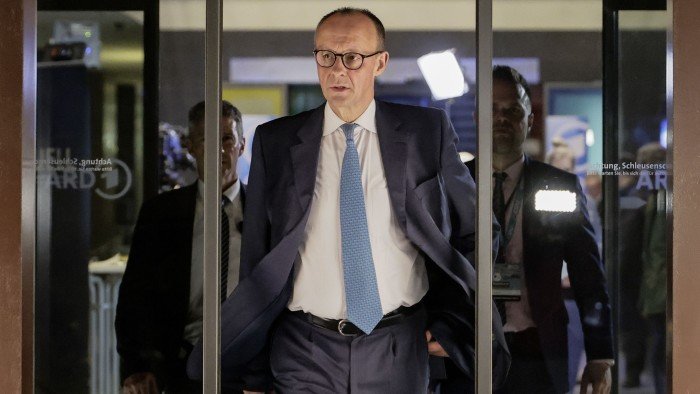German election winner Friedrich Merz faces serious hurdles to boosting defence spending in Europe’s largest nation after parties opposed to arming Ukraine secured enough seats to prevent an easing of the country’s strict limits on public borrowing.
Merz had signalled openness to reforming Germany’s “debt brake” to finance badly needed infrastructure investments and a Europe-wide drive to increase defence budgets, even as his Christian Democrats (CDU) officially maintained their commitment to the rule in the run-up to Sunday’s vote.
But the far-right Alternative for Germany (AfD) and the hard-left Die Linke have together won more than the 210 seats needed for a “blocking minority” in the German parliament.
That gives them the power to prevent any amendment to Germany’s debt brake, a rule enshrined in the constitution in 2009 to limit government borrowing and keep the structural deficit at 0.35 per cent of GDP.
The same condition applies for creating a special off-balance sheet fund such as the €100bn pot announced by Chancellor Olaf Scholz in 2022 to fund an overhaul of the German armed forces after Vladimir Putin’s full-scale invasion of Ukraine.
Holger Schmieding, chief economist at Berenberg Bank, warned that Sunday’s result could create serious problems for Merz. “At a time when it is crucial to raise spending for the military and Ukraine and ease the tax burden for workers and firms, Germany may struggle to find the fiscal space to do so,” he said.
“A failure to ramp up military spending could get Germany into deep trouble with its Nato partners. By infuriating US President Donald Trump, it would also add to the risk of a US-EU trade war,” Schmieding added.
Jan Techau, an analyst covering Germany and European defence at consultancy Eurasia Group, said: “On one of the biggest issues — perhaps the biggest issue — for the next government you have a blocking minority . . . That is a massive problem.”
Others suggested that the obstacles could force Merz to reconsider his wary attitude to EU-wide borrowing to fund the ballooning defence budgets of member states.
A senior member of Merz’s CDU on Monday ruled out a rapid reform to spending rules. “I do not believe that it is necessary to reform the debt brake,” said Thorsten Frei, a close ally of the man expected to become the next chancellor. “We have always held this view and it remains the same today.”
But economists have warned that without a change to the debt brake or the creation of a special off-budget fund, it will be impossible to finance tens of billions of euros of urgently needed extra investment in the Eurozone’s largest economy. That includes money for crumbling transport and communications infrastructure as well as a much higher defence budget in the wake of the Ukraine invasion.
The scale of the challenge has been compounded by Trump’s return to the White House, his launch of direct peace negotiations with Russia and his threat to pull US security guarantees from Europe, which has forced European leaders to hold crisis talks on how to fill the vacuum.
Although Merz has said that he believes he can find the funds to finance investment by slashing welfare payments and stimulating economic growth, many analysts do not believe such measures will be enough.
If Merz does decide to reform the debt brake — possibly as part of an agreement with coalition partners such as Scholz’s Social Democratic party (SPD) and the Greens, both of which support reform — Sunday’s results mean that he will be forced to navigate thorny political terrain.
The AfD, which secured a historic second-place finish on Sunday with almost 21 per cent of the vote, supports higher defence spending but is vehemently opposed to arming Ukraine and opposes altering the debt brake. Merz has also ruled out any form of direct co-operation with the far-right party.
Die Linke, which finished on almost 9 per cent, supports debt brake reform but is staunchly opposed to military support for Ukraine and higher spending on the German armed forces.
Jens Südekum, a professor of international economics at Düsseldorf’s Heinrich Heine University and an advocate of debt brake reform, described the situation as “difficult to negotiate, but not impossible”.
He said that it might be possible to negotiate a deal with Die Linke, perhaps by creating a special off-budget fund for civilian infrastructure and using around €50bn in savings from the regular budget to fund defence.
“The problem is they will ask for a price,” he said of Die Linke. Merz could also face strong opposition from within his party to a deal with the hard-left party, he said.
Bodo Ramelow, a senior Die Linke member, told the public broadcaster Deutschlandfunk on Monday that he would “gladly” support easing of the debt brake to fund investment in infrastructure.
AfD co-leader Alice Weidel on Monday restated her opposition to debt brake reform, and also urged Merz not to seek a deal with the left-wing party, adding: “That is exactly the opposite of what this country needs.”
Some analysts, including Schmieding from Berenberg, have argued that Merz could suspend the debt brake by declaring a national emergency, perhaps in the event of a serious deterioration of the situation in Ukraine.
But such a move would only allow a limited increase in spending for a set period. It would also risk being struck down by Germany’s Constitutional Court, which in 2023 blew a €60bn hole in the federal budget after ruling against an attempt to use pandemic-era emergency funds to pay for the green transition.
One highly unusual alternative would be to hold a vote on reform in an emergency session of the old Bundestag, according to Carsten Nickel, an analyst at the consultancy Teneo, who pointed out that there was a two-thirds majority in the German parliament elected in 2021.
But finance minister Jörg Kukies appeared to rule that out. “There’s far too little time,” he said on Monday, adding that it would be a “questionable political signal if constitutional amendments were now made with an old majority”.
Another option is to address the problem on an EU level. The European Commission has said that it is open to exempting defence investments from the bloc’s fiscal rules.
“I believe CDU will favour this [solution], rather than dealing with Die Linke — the arch enemy of the conservatives,” said Armin Steinbach, Jean Monnet Professor of Law and Economics at the Paris-based business school HEC.
German opposition has previously been one of the main obstacles to Europe-wide initiatives to boost defence spending, including the issuance of common debt. Merz said earlier this month that any such joint borrowing would have to be subject to strict conditions, but did not rule it out.
Additional reporting by Paola Tamma in Brussels





